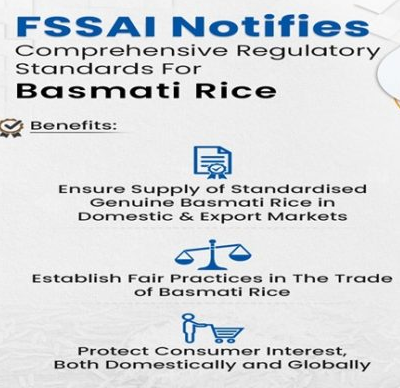FSSAI Standards for Basmati Rice | 13 Jan 2023
Why in News?
For the first time in India, the Food Safety and Standards Authority of India (FSSAI) has specified the identity standards for Basmati Rice which will be enforced with effect from 01 August 2023.
What are the Characteristics of Basmati Rice?
- Basmati has its origin from India (and some parts of Pakistan); it is a premium variety of rice cultivated in the Himalayan foothills of the Indian subcontinent.
- It is universally known for its long grain size, fluffy texture and unique inherent aroma and flavour.
- It is cultivated in Himachal Pradesh, Punjab, Haryana, Delhi, Uttarakhand, Madhya Pradesh, UT of Jammu and Kashmir and western Uttar Pradesh.
- Agro-climatic conditions of the areas where Basmati rice is grown; as well as the method of harvesting, processing and ageing of the rice contribute to the uniqueness of Basmati rice.
- Basmati is widely consumed both domestically and globally and India accounts for 2/3rd of its global supply.
- Being a premium quality rice and fetching a price higher than the non-basmati varieties, Basmati rice is prone to various types of adulteration for economic gains such as undeclared blending of other non-basmati varieties of rice.
What are the Standards for Basmati Rice?
- The standards have been notified under Food Safety and Standards (Food Products Standards and Food Additives) First Amendment Regulations, 2023.
- They are aimed at establishing fair practices in the trade of Basmati rice and protecting consumer interest, both domestically and globally.
- Standards:
- Basmati rice shall possess the natural fragrance characteristic of basmati rice
- Basmati rice has a unique fragrance and flavour due to the presence of a chemical called 2-acetyl-1-pyrroline.
- It should be free from artificial colouring, polishing agents and artificial fragrances.
- Further, these standards also specify the average size of Basmati grains and their elongation ratio after cooking; maximum limits of moisture, amylose content, uric acid, defective/damaged grains and incidental presence of other non-basmati rice etc.
- Basmati rice shall possess the natural fragrance characteristic of basmati rice
UPSC Civil Services Examination, Previous Year Question (PYQ)
Q. Consider the following statements: (2018)
- The Food Safety and Standards Act, 2006 replaced the Prevention of Food Adulteration Act, 1954.
- The Food Safety and Standards Authority of India (FSSAI) is under the charge of Director General of Health Services in the Union Ministry of Health and Family Welfare.
Which of the statements given above is/are correct?
(a) 1 only
(b) 2 only
(c) Both 1 and 2
(d) Neither 1 nor 2
Ans: (a)
- Food Safety and Standards Authority of India (FSSAI) is an autonomous body under the Ministry of Health and Family Welfare, GoI. It has been established under Food Safety and Standards Act, 2006 which consolidates various acts and orders that have hitherto handled food related issues in various Ministries and Departments.
- The Food Standards and Safety Act, 2006 replaced several Acts and Orders like the Prevention of Food Adulteration Act, 1954; Fruit Products Order, 1955; etc. Hence, statement 1 is correct.
- FSSAI is headed by a non-executive Chairperson, appointed by the Central Government, either holding or have held a position not below the rank of Secretary to the GoI. It is not under the charge of Director General of Health Services. Hence, statement 2 is not correct.
- FSSAI has been created for laying down science-based standards for articles of food and to regulate their manufacture, storage, distribution, sale and import to human consumption.
- Therefore, option (a) is the correct answer.

